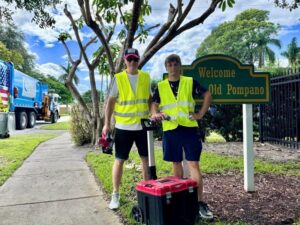

Today, U.S. National Security Advisor Jake Sullivan and the Republic of Korea (ROK) National Security Advisor Cho Tae-yong chaired the inaugural U.S.-ROK Next Generation Critical and Emerging Technologies (CET) Dialogue in Seoul. The launch of the Next Generation CET Dialogue fulfills a commitment that President Biden and President Yoon made during the April 2023 State […]
The post JOINT FACT SHEET: Launching the U.S.-ROK Next Generation Critical and Emerging Technologies Dialogue first appeared on Social Gov.
Today, U.S. National Security Advisor Jake Sullivan and the Republic of Korea (ROK) National Security Advisor Cho Tae-yong chaired the inaugural U.S.-ROK Next Generation Critical and Emerging Technologies (CET) Dialogue in Seoul. The launch of the Next Generation CET Dialogue fulfills a commitment that President Biden and President Yoon made during the April 2023 State Visit to upgrade bilateral technology cooperation as the two countries take monumental strides to modernize the U.S.-ROK alliance, now in its 70th year.
National Security Advisors Sullivan and Cho underscored their intent to anchor the initiative in strategic technologies that will be of greatest consequence to bolstering economic prosperity; enhancing resilience against supply chain disruptions; and securing competitive advantages for our two nations and like-minded partners. At the outset, the Next Generation CET Dialogue will drive cooperation across six main strategic technology areas, including semiconductor supply chains and technology; biotechnology; batteries and clean energy technology; quantum science and technology; digital connectivity; and artificial intelligence. The National Security Advisors also highlighted the crucial importance of aligning and adapting our technology protection toolkits, including the recently announced Disruptive Technology Protection Network and investment screening mechanisms, as an important effort to prevent the leakage of sensitive and dual-use technologies.
In addition to the National Security Advisors, the Next Generation CET Dialogue featured high-level representation from the Ministry of Foreign Affairs, the Ministry of Science and Information and Communication Technologies, the Ministry of Trade, Industry, and Energy, the Ministry of Health and Welfare, and the Ministry of Education on the ROK side. They were joined by senior officials from the Department of State, the Department of Energy, the National Science Foundation, the White House Office of Pandemic Preparedness and Response Policy, and the White House Office of Science and Technology Policy. The two sides committed to carrying forward the Next Generation CET Dialogue as an outcomes-oriented, whole-of-government endeavor across the innovation value chain to advance high-level CET policy priorities.
During the inaugural CET Dialogue, the United States and the ROK welcomed enhanced cooperation between our governments, industry, and academia across the following domains:
Semiconductor Supply Chains and Technology:
- Upgrade cooperation between the National Science Foundation (NSF) and the Ministry of Science and ICT and key industry partners, including through granting teams of U.S. and Korean researchers preferential access to advanced technology nodes to support expanded joint research and development (R&D) opportunities.
- Lay the groundwork for deeper collaboration between our respective public and private semiconductor research and development organizations, including exchanging best practices and outlining shared R&D priorities through the U.S. Department of Commerce and ROK Ministry of Trade, Industry, and Energy-led Supply Chain and Commercial Dialogue, within which the United States and the ROK intend to launch a forum for discussions to connect interested public and private research institutions, including the to-be-established U.S. National Semiconductor Technology Center and the Korean Advanced Semiconductor Technology Center.
Biotechnology and Biomanufacturing:
- Launch new collaboration on bioeconomy R&D between the ROK Ministry of Science and ICT and NSF in 2024, with the intention of supporting research collaborations with an anticipated value of no less than US $10 million.
- Implement the MOU between the Lawrence Berkley National Lab and Korea Research Institute of Bioscience and Biotechnology on bio-foundry, signed this April, including through pursuing personnel exchanges, expanded information sharing, and reciprocal demonstrations of capabilities and technologies to support our respective test beds.
- Expand collaboration between the National Institutes of Health and the Ministry of Health and Welfare, with a focus on exploring MD-PhD talent exchange programs; enhancing biomedical research cooperation; and discussing opportunities for cooperation between research hospitals, particularly on cell and gene therapies, treatments for rare diseases, and diagnostic devices.
- Strengthen coordination between the U.S. Advanced Research Projects Agency for Health (ARPA-H) and the Korean Ministry of Health and Welfare and the Korea Health Industry Development Institute to catalyze health innovation R&D.
- Launch a track 1.5 channel in 2024 focused on accelerating bilateral R&D initiatives; identifying active pharmaceuticals, starting materials, and other inputs that can be diversified and “friend-shored;” and building resilience in global biopharmaceutical supply chains.
- Enhance collaboration between the U.S. National Institute of Allergy and Infection Disease and the ROK National Institute of Infection Diseases on biomedical research cooperation related to infectious diseases and immunology in areas of shared interest.
- Enhance cooperation on Cancer Moonshot Initiative 2.0 including implementing the MOU between the Korean National Cancer Center and the U.S. National Cancer Institute and discuss possible further collaboration between the United States and the ROK.
Batteries and Clean Energy Technology:
- Expand R&D between U.S. National Labs and counterpart Korean research institutes, and explore research and talent exchanges focused on next-generation secondary batteries—particularly related to lithium metal batteries, all-solid-state batteries, sodium-ion batteries, and other key clean energy technologies.
- Deepen joint research on utility-scale energy storage, including through the partnership between the Pacific Northwest National Laboratory and the Research Institute of Industrial Science and Technology on intermediate temperature sodium metal halide development.
- Advance a new MOU to build cooperation between Sandia National Laboratories and the Korea Electrical Safety Corporation to collaborate on joint research projects in the field of Battery Energy Storage System safety technologies, including the development of a battery safety database and international standards.
- Enhance collaboration in next-generation battery technology R&D, building upon the recent conclusion of an MOU between the Korea Planning Evaluation Institute of Industrial Technology and the Industry and University Cooperative Research Center for Efficient Vehicles and Sustainable Transportation Systems.
Quantum:
- Advance new scientific and technical collaboration under the Cooperation Agreement between the U.S. National Institute of Standards and Technology and the Korea Research Institute of Standards and Science to promote research in support of next-generation superconducting quantum computing.
- Enhance government and industry cooperation in multilateral fora, including through collaboration between the Quantum Economic Development Consortium and the Korea Quantum Industry Association.
- Initiate research discussions and explore opportunities for new university collaboration on joint research activities, joint conferences, workforce development programs, exchanges of information, and faculty and scholar visits.
Artificial Intelligence and Standards:
- Deepen collaboration on international governance frameworks for AI through promoting mutually reinforcing international initiatives – including the United States’ announcement of the Political Declaration on the Responsible Military Use of AI and Autonomy and the G7 Code of Conduct and the ROK’s hosting of the Mini Virtual Summit on AI, the Global AI Forum, and the Responsible Artificial Intelligence in the Military Domain Summit (REAIM) – and welcoming progress in our respective domestic policy processes on AI governance. The ROK also noted its contributions to promoting international discussions on AI norms, including through its Digital Bill of Rights.
- Launch a new bilateral AI Working Group, with a focus on cooperating in efforts to develop international standards, advancing joint research, and fostering interoperability in AI policies to ensure safe, secure, and trustworthy AI.
- Conclude an MOU on technology standards between the National Institute of Standards and Technology and the Korean Agency for Technology and Standards.
Digital Connectivity and Information Communication Technologies (ICT):
- Deepen cooperation on cloud technology and reliability, including through launching expert discussions on innovative cybersecurity approaches and expanding R&D, exchanges, and mutual investment to support resilient and energy-efficient cloud infrastructure and service.
- Promote secure and resilient ICT infrastructure in the United States, the ROK, and third countries through jointly identifying and supporting financing options for Open RAN testbeds, pilot projects, capacity-building programs, and operational deployments in Southeast Asia and other priority regions, and explore collaboration on international standardization in areas such as 5G and 6G.
- Advance a common approach to the trusted free flow of data, including through supporting the expansion of the Global Cross-Border Privacy Rules (CBPR) Forum and promoting cooperation on data protection and privacy in third countries.
Partnership with Like-Minded Nations
- Hold National Security Council and National Security Office-led consultations with like-minded partners on critical and emerging technologies including through launching an informal trilateral technology dialogue with India in the first quarter of 2024.
The United States and the ROK recognize that the combined talent of our nations and our rich people-to-people ties form the bedrock of cooperation and commit to redouble efforts to promote STEM exchanges and workforce and student mobility programs. Through the Next Generation CET Dialogue, we intend to double down on our work together, at the leading edge of innovation, to propel our ambitious technology partnership into the future and deliver a more prosperous, secure, and stable future for our two people and for the Indo-Pacific region.
Official news published at https://www.whitehouse.gov/briefing-room/statements-releases/2023/12/08/joint-fact-sheet-launching-the-u-s-rok-next-generation-critical-and-emerging-technologies-dialogue/
The post JOINT FACT SHEET: Launching the U.S.-ROK Next Generation Critical and Emerging Technologies Dialogue first appeared on Social Gov.
originally published at Politics - Social Gov


